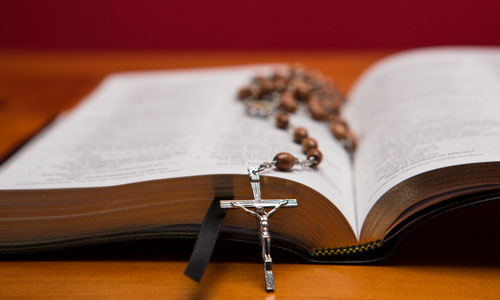WelCom February 2020
James Lyons
Pope Francis has claimed the Third Sunday of Ordinary Time as a day to give special honour to the Word of God and to promote the study and reading of Holy Scripture. The first celebration was 26 January. This article expands the theme, exploring the power of human words as a way of entering the mystery of God’s words.
Quieten down or you’ll wake the neighbours! That’s the cry of anyone trying to quell the super-charged excitement of children opening presents in the early hours of Christmas morning! Look what I’ve got! is both explosive and irrepressible.
Words are unique in the way they break silence. They announce human presence. They are intrusive and very different to the sound of wind or rain or even birdsong. They can wake up the neighbours more effectively than a thunderclap!
Words are also unique for the power they contain. Both creative and destructive power. With just one word, you or I can change an atmosphere from sad to joyful, from joyful to sad. Words can make, break or heal a friendship. Our words can console and equally condemn; they can create laughter or tears, pain or enjoyment.
As well as announcing my presence, my words define me. They say much about my personality, my background and character. By listening to my own words, I can discover who I really am.
Most important, words connect us with one another. They are the threshold of community, essential to the fabric of society. To ‘give your word’ speaks of your affection for and commitment to the one receiving it; to be ‘as good as your word’ places your ‘word’ above every other consideration. In that sense, our words are all powerful.
Given this significance of words to human existence and, indeed, to the continuation of life on our planet – for words can also enable greed to flourish, rain forests to disappear or water to die – we must stand in awe and wonder at the even greater power of the Word of God!
The Bible tells us that creation is the result of the God’s Word. God said – Let there be…! That’s all it took. How powerful is that?
The ‘Big Bang’ theory is popularised by those who prefer to dismiss the idea of an Intelligent Being existing prior to creation. But, I suggest there really was a ‘Big Bang’. It was the explosion of God’s Word, excitedly preparing our wonderful world.
Like the children enjoying their Christmas presents and letting the neighbourhood know of their thrill, God’s Word shouted into existence the beautiful and joyful reality of creation. It wasn’t formed all at once, but God knew the potential it carried and wanted nothing more than to have the gift discovered, unwrapped, developed and looked after.
The Bible is not a scientific book explaining how things came to be; it is a love story, opening us to the drive of love to create and reproduce. It is a book telling the ‘why’ of creation; that love cannot be contained and is unending.
Each page expands the theme, introducing episodes and characters and preparing for the main act – the gift of Jesus, beautifully and typically described by Pope Francis as ‘God’s smile’.
We are given tastes of this love story whenever the Word is proclaimed. This is why our Readers, Proclaimers of the Word, are crucial to our worship. As tellers of the story, they announce the Word that ‘cuts more finely than any two-edged sword’ [Hebrews 4:12]. These ‘tastes’ are like starters or entrees. Served well, they can spur us on to want more, to know more.
Pope Francis, calling for greater reflection and study of Scripture, asks us to take more notice of the Scriptures at Mass (Liturgy of the Word), to read them in context, maybe participate in a study group, and to develop an affection for this living, sacred Word.
The Word of God put on human flesh and became one of us. What more assurance do we need. Knowing that God’s word has been given in this most wonderful way, undoubtedly tells us we are smiled on and greatly loved.
May our hearts be opened to embrace the Word in every possible way and, with profound gratefulness, to shout it from the housetops.
Fr James Lyons is a priest of the Archdiocese of Wellington.
